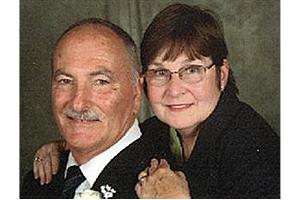Alzheimer’s changes couple’s plans
 |
| Submitted photo - Tim and Nancy Thompson had this picture taken in anticipation of their 30th wedding anniversary, which was July 17. |
By TIM JOHNSON, Staff Writer, [email protected]
Tim and Nancy Thompson of Neola had planned to retire. They figured they would get a vacation home someplace warm, do some traveling and take it easy.
Tim’s Alzheimer’s disease changed all that.
“It changes your life so radically,” Nancy said. “We went from having plans to retire and move to having me go back to school and then work full-time and just forget about retirement.”
Until a few years ago, Tim, 62, worked as radiologic technologist at the Veterans Affairs Hospital in Omaha. Then he started having memory problems.
“I lost my memory,” he said. “I couldn’t understand why I had a problem remembering things. A lot of it had to do with the profile of my vocabulary. I lost a lot of words that I used to know that were very descriptive of what I was dealing with. If someone else would say it, I would remember it. It was frustrating.”
“He wasn’t really able to work full-time anywhere after that,” Nancy said. “We didn’t know what was happening.”
Nancy went back to school full-time at Iowa Western Community College and earned an associate degree in the administrative assistant program, she said. She worked at the college during school and got on full time after she graduated.
Since leaving
the VA Hospital, Tim has had a custodial job
and a couple other positions but has
gradually shifted his focus to volunteer
work. He has done construction work for
Habitat for Humanity and regularly helps
serve meals at the Council Bluffs Senior
Center and deliver Meals on Wheels. He also
runs errands for people and takes them to
appointments and pharmacies.
Tim’s doctor at the VA Hospital tracked down
the culprit.
“Dr. Gonzalez listened very carefully to
what he was saying and got Tim on the right
path,” Nancy said.
He was “very helpful,” Tim said. In
February, Tim had an MRI that confirmed the
diagnosis, he said.
“One of the most thorough and complete
diagnoses is through an MRI, because it
really gives a complete profile of the
condition of the brain; and they can see the
cell situation – the cells decreasing,” he
said.
His physician put him on a medication that
is supposed to slow the progress of the
disease.
In his case, it was a surprise, Nancy said.
“He doesn’t have anybody in his family that
has it – especially the early-onset,” she
said.
While age is a major risk factor for
Alzheimer’s, it isn’t a pre-requisite for
the disease, said Clayton Freeman, program
director for the Midlands Chapter of the
Alzheimer’s Association.
“We think in the U.S. there’s probably
2,000-plus cases of what we call early-onset
Alzheimer’s disease” – cases where the
patients are younger than 65 years old.
“They have a whole different set of
problems,” said Rosalie Shepherd, education
coordinator for Southwest Iowa.
The Thompsons have joined an early-onset
support group in Omaha sponsored by the
Midlands Chapter and an early-stage group
offered at St. John Lutheran Church in
Council Bluffs.
“She keeps me scheduled with the other
people; and that’s very valuable, because
we’re all dealing with the same thing,” Tim
said.
“Support groups are really important,” Nancy
said. “We’ve become friends with a couple of
the other couples there.”
Besides receiving support from other couples
dealing with Alzheimer’s, they have listened
to presentations and received material from
the Alzheimer’s Association, Nancy said.
“They taught us the different stages,” she
said. “They teach us about safety. They
encouraged us to take care of power of
attorney legal and end-of-life kinds of
things – and we did that.
“The safety part is important; because, at
certain times of the disease, his vision
could be affected – his visual acuity.”
Fortunately, Tim’s eyesight has not been
affected.
“There’s a lot of tings I used to do that I
don’t do anymore,” he said.
He hasn’t taken his boat out for a while,
and he hasn’t driven to California by
himself like he used to do every year.
But the couple keeps on keeping on and
making adjustments as the need arises. Tim
continues to do volunteer work, as well as
work around home, Nancy said.
“He takes care of the house, and he takes
care of the animals (pet dog and cat),” she
said. “He mows the lawn. He takes care of
this whole acre we have here. I leave lists
for him and notes. We talk to each other on
the phone a lot. I try to be real
supportive.”
“And she is,” Tim said.
“I don’t want him to be uncertain about
what’s going on,” Nancy said. “And we’re
very much a part of this together. I think
we’re doing pretty good with this. I think
we take pretty good care of each other,
don’t you?”
“Oh, yeah,” Tim said. “We really enjoy
spending time together.”
“We take road trips together,” Nancy said.
“Our hope is in Jesus Christ. He’s our hope.
Death is inevitable here on this planet. It
just comes in varying forms.
“When we first started going to the
Alzheimer’s group, we were told this is a
journey – and it is,” she said. “But I don’t
feel like it’s a tragic one.”